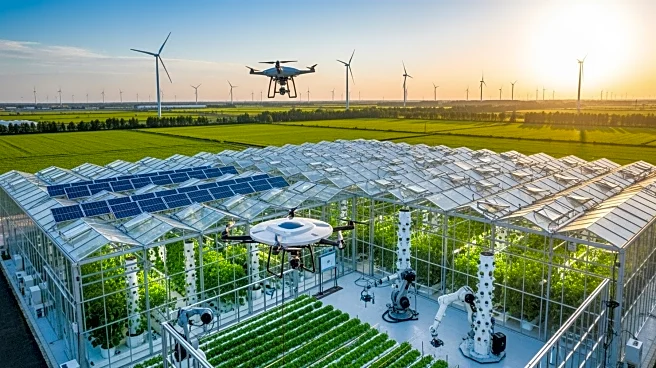What's Happening?
China is focusing on transforming its agricultural sector to address the challenges posed by global climate change and ensure food security. According to Sun Qixin, president of China Agricultural University,
agriculture contributes significantly to greenhouse gas emissions, including methane and nitrous oxide, which are more potent than carbon dioxide. To mitigate these effects, China is investing in technological innovations and smart agriculture practices. The country aims to reduce emissions and increase carbon sequestration, positioning agriculture as a major carbon sink. This transformation is part of China's broader goal to become an agricultural powerhouse, similar to models seen in the United States, Canada, and Europe, but adapted to China's unique smallholder farming system.
Why It's Important?
The transformation of China's agricultural sector is crucial for global food security and climate change mitigation. As agriculture accounts for a significant portion of greenhouse gas emissions, innovations in this sector can lead to substantial reductions in these emissions. By adopting smart agriculture practices, China not only aims to secure its food supply but also contribute to global efforts in combating climate change. This initiative could set a precedent for other countries, encouraging them to adopt similar practices. The focus on reducing the urban-rural income gap and improving rural environments highlights the social implications of this transformation, potentially leading to more equitable economic development.
What's Next?
China plans to continue its cooperation with developed countries to enhance agricultural technology and achieve global food self-sufficiency. The integration of artificial intelligence in agriculture is expected to play a significant role in this transformation. As China strengthens its agricultural enterprises, it will likely focus on expanding the scale of operations and increasing the added value of agricultural products. These efforts are aimed at improving productivity and competitiveness in the global market. The ongoing commitment to international aid and cooperation suggests that China will continue to support other developing countries in their agricultural advancements.
Beyond the Headlines
The shift towards a low-carbon, green agricultural system in China has broader implications for global environmental policies. As agriculture serves as both a source of emissions and a carbon sink, the dual focus on reducing emissions and increasing carbon sequestration could influence international climate agreements and strategies. Additionally, the emphasis on smart agriculture and technological innovation may drive advancements in related fields, such as artificial intelligence and biotechnology, fostering cross-sector collaborations and innovations.










